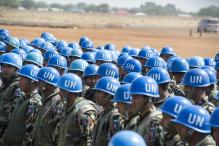The threat of non-State actors acquiring and using weapons of mass destruction (WMD) emerged as a global concern following revelations about al-Qaeda’s nuclear ambitions in the aftermath of the September 11 terrorist attacks. The unraveling of the A.Q. Khan proliferation ring in 2004 provided a further cause of concern when Khan, the father of Pakistan’s nuclear weapons program, confessed to heading a black market network that aided the Iranian, North Korean, and Libyan nuclear programs. In response, the United Nations Security Council unanimously adopted resolution 1540 (2004), which obliged all Member States to take appropriate and effective measures to prevent the proliferation of nuclear, chemical, and biological weapons, their means of delivery, and related materials to non-state actors, particularly for terrorist purposes.
Following brief extensions in 2006 and 2008, resolution 1977 (2011) extended by ten years the mandate of the 1540 Committee, which serves as an information and assistance clearinghouse and to oversee implementation of that resolution. The text also provided for two comprehensive reviews of the status of the implementation of resolution 1540, the first of which is to take place in 2016. And, acknowledging the value of involving all relevant stakeholders, the resolution encouraged the 1540 Committee “to draw also on relevant expertise, including civil society and the private sector, with, as appropriate, their State’s consent.”
It was in the context of the 2016 comprehensive review that the UNU Centre for Policy Research (UNU-CPR), in cooperation with the UN Office for Disarmament Affairs (UNODA), convened the UNSCR 1540 Civil Society Forum: A Dialogue with Academia and Civil Society on 11-12 April 2016 at UN Headquarters in New York. The event was designed as an opportunity for civil society to provide input into the resolution 1540 review process. 26 internationally-renowned experts and scholars from academia and civil society around the world were invited to 1) assess the non-state proliferation threat in light of changing circumstance since 2010, 2) to discuss academia’s role in national, regional, and international efforts in 1540 implementation, and 3) to provide feedback to the Committee and its Group of Experts on transparency and outreach efforts.
In the rapporteur summary of the forum, which was held under the Chatham House Rule, speakers and participants called attention to:
-
The increased magnitude of the non-state threat, as there has been a marked increase in the number and capability of groups – such as the Islamic State in Iraq and the Levant (ISIL, also known as Da’esh) – seeking to commit unconventional attacks. While there has been much action taken by governments in line with their 1540 obligations, limited resources especially in the developing world prevent Member States from addressing all of the vulnerabilities of the global supply chain.
-
The discrepancy in awareness of the different dimensions of the WMD threat. In particular, there remains greater public skepticism and less political attention to the possibility of biological terrorism. This provides an opening for civil society to contribute. Academics must mobilize to play a greater role in engaging government regulators and the 1540 Committee on how to address biological safety and security concerns, while increasing self-regulation in their laboratory work.
-
The social responsibility borne by academic communities in contributing to an overall WMD security culture. This is especially true of those whose work centers on technologies linked to the design, manufacture, or use of WMD and their delivery systems. Scholars must consider the consequences of promulgating their research, disseminate information of proliferation threats to the public, and act as intermediaries for educating the broader academic community.
-
The need to improve existing analysis of Member State implementation of resolution 1540, as much of the attention to date has centered on reporting rates. Academics could help shift the conversation by providing outside assessments that highlight compliance, or partaking directly in peer review processes that gauge performance. Meanwhile, the Committee could increase the accessibility of raw data from individual country matrices, allowing for geospatial and temporal analyses.
-
The value of the Committee continuing to actively reach out to all stakeholders, including academia and civil society. While the legal responsibility for implementation ultimately rests with Member States, the scope of the mandate means that action must not be confined to those taken by governments. An ever-growing list of civil society-focused events is a positive sign; however, the Committee could develop a more systematic approach to key stakeholders outside government.
Overall, participants expressed a positive outlook regarding the future of resolution 1540 and the role of academia in the process. Still, in light of resource limitations, they stressed the importance of coordination across the nuclear, biological, and chemical fields, as well as the need to integrate the principles and themes of resolution 1540 into existing instruments.
Access UNSCR 1540 Civil Society Forum: A Dialogue with Academia and Civil Society here.




